

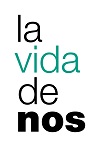
When she learned that she was pregnant with her second child, María Gabriela Chalbaud knew that she had to do something to make more money because what she earned as a university professor was no longer enough. So, she and her friend Yanet Calderón decided to act upon an idea she had for a very singular undertaking: they would become the substitute daughters of many Venezuelans who had left their parents and grandparents behind when they migrated.
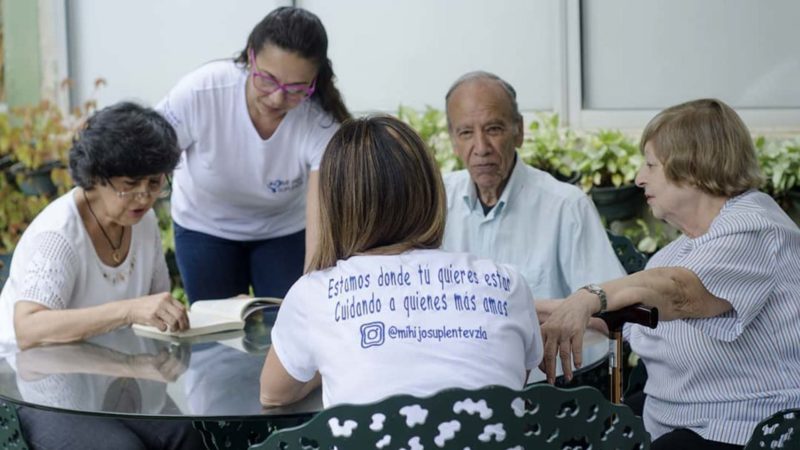 Photos: Family Album
Photos: Family AlbumMaría Gabriela Chalbaud’s mother would worry every time she thought of her friends who had ended up on their own after their families migrated. They were all like her: university professors who had retired from the Central University of Venezuela and who, in better times, had earned monthly salaries of up to $3,000.00, as much as those dwindled over the years. Upon retirement, they were assigned a pension that wasn’t even enough to put food on the table.
One day, she voiced her concern to her daughter María Gabriela, an educational psychologist who had been involved in social causes from a very young age.
“We should open a soup kitchen for older people,” she suggested María Gabriela.
That was the starting point. From time to time, María Gabriela would go to the homes of her mother’s neighbors and friends and would take them to their medical appointments or to the grocery store. In addition to helping them find their medicines, she made sure that they actually took them. But, most importantly, she would keep them company and talk to them as a loving and devoted daughter would do.
Many needed affection and understanding.
Looking for support, she asked Yanet Calderón if she wanted to join her. They had met in 1992 in the corridors of the Central University of Venezuela and became friends. Yanet, who is an administrator, agreed enthusiastically. Since she was helping with a sister who had been diagnosed as intellectually disabled, she thought she could put to use some of her experience into accompanying older adults.
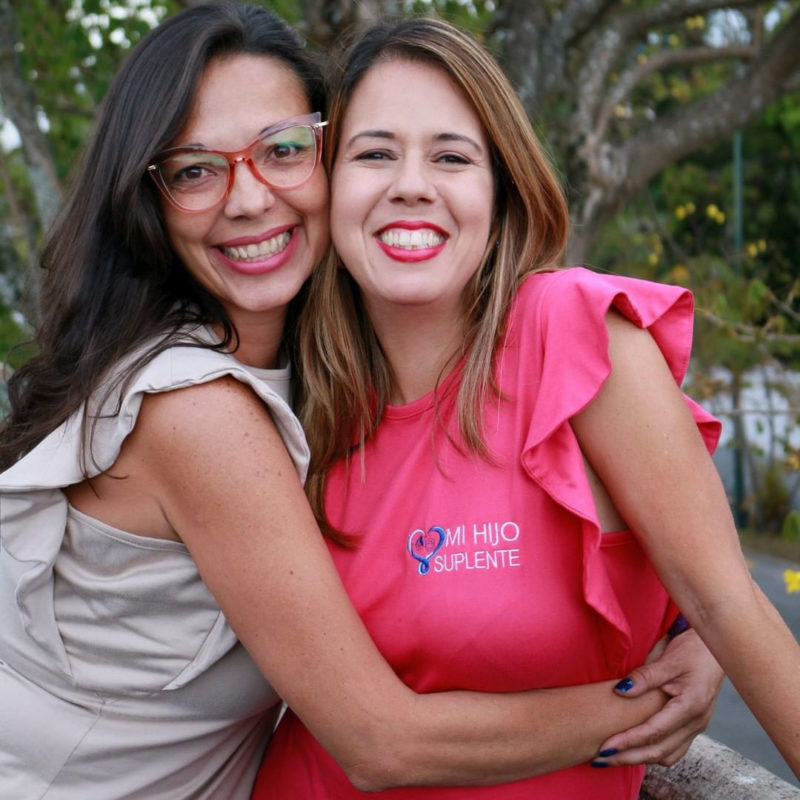
María Gabriela and Yanet would routinely go to places in Caracas such as Caricuao, Caurimare, El Cafetal, El Marqués, La California, Macaracuay, Santa Fe and Montalbán to visit a number of older people who lived all by themselves. Many were upper middle class, but behind closed doors they had many an unmet need and, in some cases, even their faucets and toilets were out of order. Those older persons who had once worked really hard to buy their houses could not even afford to pay to have the things that broke at home repaired, so they simply stopped using them.
Their emaciated look made Maria Gabriela and Yanet aware that the humanitarian crisis affecting Venezuela had been long in the making. They both came to the realization that, while they had only just begun to feel its effects, other people had been struggling to eat well and take their medicines for quite some time, thus becoming more vulnerable to health complications such as hip fractures from a low intake of calcium, which is so necessary in old age. The older adults they kept company used to hide their issues from their relatives, even from those who were still in Venezuela and who, like them, were facing hardship.
María Gabriela, who had herself entertained the idea of leaving the country, understood how agonizing the situation was for those older people’s relatives, knowing that their loved ones would have no one to turn to in case of an emergency.
As the only child of an only child, María Gabriela had had to handle many things on her own, from getting the insulin her mother needed as a diabetic, to dealing with the insurance paperwork whenever she took her to a doctor’s office. If her mother was hospitalized, she knew she would have to spend the next few days with her at the healthcare facility because she had no one to cover for her. And, as grueling as those days were, she had to stay strong and offer her mother emotional support.
At the end of 2017, the news that she was pregnant made her worry even more about money, as with the pay she received every two weeks she was buying fewer and fewer things. And understandably so, for her salary as a university professor only bought her 1 liter of cooking oil, 1 kilogram of corn flour, and 1 quarter kilogram of coffee. And that was it.
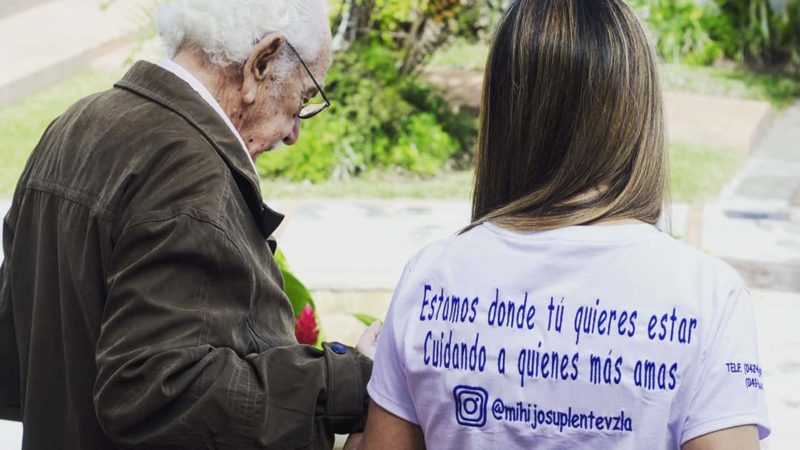
With her second child already on the way, it was urgent for María Gabriela to find another source of income. So she decided to turn the work she had been doing thus far into a social entrepreneurship. The object was crystal clear from the very beginning: both she and Yanet would substitute for those migrants who had had to leave their parents and grandparents in Venezuela and would provide them with the company and care that, from a distance, their relatives could not. For a fee, they would work for a given number of hours a week that they would dedicate to taking care of each older person individually.
Hence the name Mi hijo suplente (My Substitute Child).
Their idea earned them a scholarship to attend a diploma program at the Institute of Advanced Management Studies, where they designed a first business model that they further improved in 2018 when they participated in the Ideas Contest, a platform for the promotion of innovation projects. They had signed up in the hope of taking the cash prize to use it as seed money.
They did not win, but they were among the sixty runners-up out of more than 462 entrants. Their achievement was recognized with the opportunity to attend workshops by experts in law, economics, advertising and other areas. Those learning experiences, as well as the financial and digital marketing support they received from abroad from Mauricio Arcas, who was their third partner for a while, gave them the extra drive they needed.
At the beginning of 2019, they were contacted by their first client. It was a woman calling from Greece. She had heard about María Gabriela and her work and wanted her to take care —on her behalf, as a doting daughter would do— of an aunt who had raised her with great love.
She gave the woman her word.

Maritza, the client’s aunt, had Alzheimer’s disease. So, the first thing María Gabriela did was to learn about the condition; she even consulted a nutritionist who came up with a special diet for Maritza. With her expertise as an educational psychologist, she designed a number of cognitive remediation therapy exercises where they would sit together to read, write and play board games, which reinforced Maritza’s analytical and problem-solving skills and kept her company.
In a matter of months, Maritza became another mother to María Gabriela. She visited her two or three times a week at her apartment in Caracas and checked that she was taking her medication and supervised her diet. She made sure to treat Maritza to the food that she liked, including desserts such as quesillo, which Maritza absolutely loved.
And she would also take her on outings, for an ice cream, to the park, to the hairdresser’s and to the manicurist, as if they were two good friends.
A very special bond developed between the two of them. Although Maritza had people who looked after her, she only allowed her “substitute daughter” into her room. For María Gabriela, it was a token of her affection, a way of telling her that she enjoyed her company.
After three years of companionship care, they have managed to slow Maritza’s cognitive deterioration.
Ever since they started working in Mi hijo suplente, María Gabriela and Yanet have trained in old age people sitting, including taking a first aid course and attending a workshop on the care of Alzheimer’s patients. They are still learning, but they are consolidating their experience with their daily work with another fourteen older adults whom they provide companionship care.
Over the past three years, they have acquired tools to address cases individually.
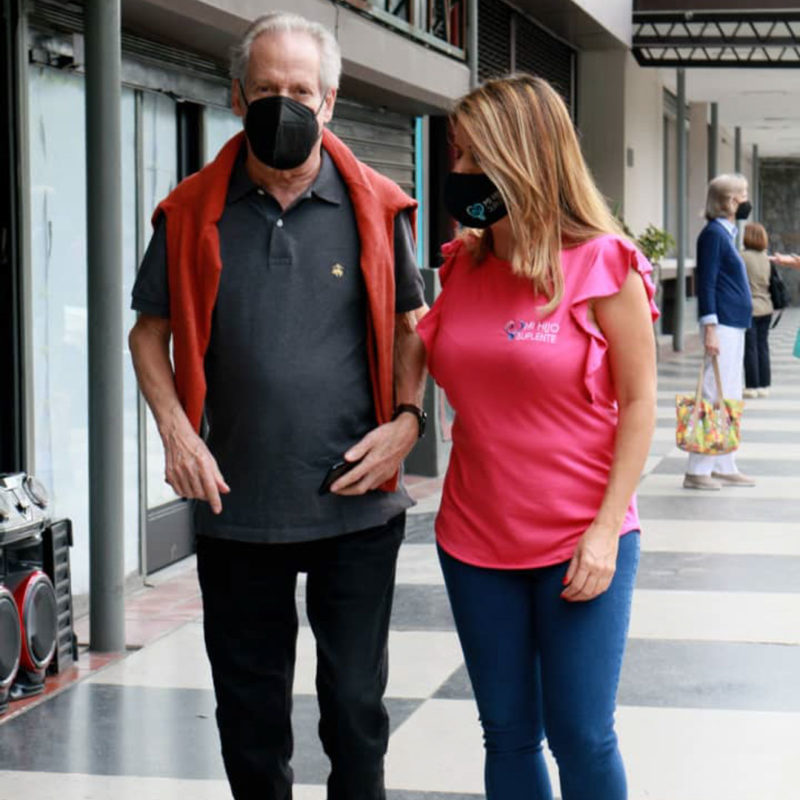
Interaction during visits is also used to look for signs of physical or emotional distress, which the companion caregivers or acompañantes report to the person’s relatives and to their trusted medical staff so that they can be addressed in a timely manner. Their reports thoroughly document the day’s events and are supported by photographs. The team is on the lookout for the slightest warning sign, because older people tend to hide their issues and ailments behind a wellbeing façade to protect their loved ones living abroad.
That is why another part of their work consists in offering those who hire them a more realistic idea of the status of their relatives in Venezuela. This is something that some people find very difficult to deal with because, although they migrated several years ago, they still keep the image of the parents and the country they left back then.
Yanet and María Gabriela have even learned to perform in risky situations.
Like the day that ended in gunfire.
It happened while they were attending to a woman who had had a number of complications from a fall. She had just been discharged after a particularly eventful week in the hospital, for the patient’s husband, an 80-year-old man, did not allow Yanet and María Gabriela to stay with her there; he refused to leave her wife’s side and went several nights without sleep.
Back home, the patient wet herself in the middle of the night. As she was still immobilized and in excruciating cervical pain, the companion caregivers tried to change her diaper with great care, but the woman screamed at their mere touch.
Much to their shock, the husband suddenly entered the room and threatened them with a gun. The weapon was not loaded, as they had already come across it and had preventively removed and hidden the ammunition. The man went up the stairs. For a moment, it seemed that the situation was not going to escalate further, but the man returned and fired into the air.
It turned out he had gone upstairs to get some bullets he had stashed away.
The companion caregivers ran out of fear.
The neighbors arrived in no time, and the psychiatrist they had summoned for support got there sometime later. After a few days, he told them that the patient’s husband had reacted violently as a result of a psychotic break he had suffered from the anguish he experienced after his wife’s fall.
Eventually, they both recovered, and Yanet and María Gabriela learned from the experience that they had to take every precaution, including hiding weapons, sharp knives or any object that could put them in harm’s way.
Since they spend most of their time with the older adults that they take care of, the latter are now among their dearest people: they have become close and remind them of their own relatives. The line that separates work from personal life is now blurred for the companion caregivers, and every now and then they get a phone call outside working hours from any one of them who feels lonely and wants to talk for a while.
They answer their calls, but they must also make sure that their time on the phone does not interfere with that for self-care or for sharing with their own families. They are now considering doing on-call work in various shifts.
“Mi hijo suplente has given us a clearer glimpse into what life might have in store for us. It has made us think that it’s not all about fun and pleasure. Old age is hard, expensive, limiting; it is also sad and very lonely at times. As we go about our lives, we don’t realize that we are going to be old soon. This work has made us aware of how things could turn out for us,” says María Gabriela.
Yanet nods in support of her friend and business partner’s words.
Sitting in a small office in Chacao, which they have recently taken, the two entrepreneurs talk about their plans to expand their business.
“We have gone step by step, organically. We did not have a start-up capital. Our only capital is our resolve,” remarks María Gabriela.

The current team of substitute children consists of four educational psychologists who perform as companion caregivers for older people in the metropolitan area of Caracas, in addition to a network of allies (healthcare personnel, physicians and nurses) who assist them should they need them. For now, they are focused on training new hires in their entrepreneurship’s philosophy and values: quality companionship, active listening and closeness. They recently recruited nine people to cover the Guarenas, San Antonio de Los Altos, Mérida and Maracay areas.
The founders of Mi hijo suplente have two dreams they wish to accomplish.
The first one is to formalize the Adopta a un abuelo (Adopt a Grandparent) program, which is a sponsorship system to provide support to older people who need company and medical care. It is an initiative that they hope to incorporate into the company’s social work framework as they grow. Recently, a client donated some unused hours she had left after her mother passed away, which Yanet used on an old man who needed assistance to go to the doctor.
The second one is the old people’s home project they are working on. They have to estimate costs to look for funds and sponsors, but they have gotten off to a good start with two investors expressing interest in their idea. They would use the funds to buy the house, which they have to fit out in no time to meet María Gabriela’s goal of inaugurating it when she turns 50… and she is almost 49.
They are open to evaluating proposals that can contribute to their project, even if they come from people with no financial resources but willing to help.
“We would love to find someone who says “I have no money but I have this house and I want to take part in your project.” That could be an option.
And that’s what they want: to find a big, well-lit house in a nice neighborhood with natural green areas where they can develop their project. They want it to be a place that offers activities for older people where they are welcome to come as they please.
And where they feel happy, as if they were part of a family.
987 readings
I am a journalist. I tell stories to escape from immediacy. I insist on hitting the streets. I want to see my name printed in a newspaper.